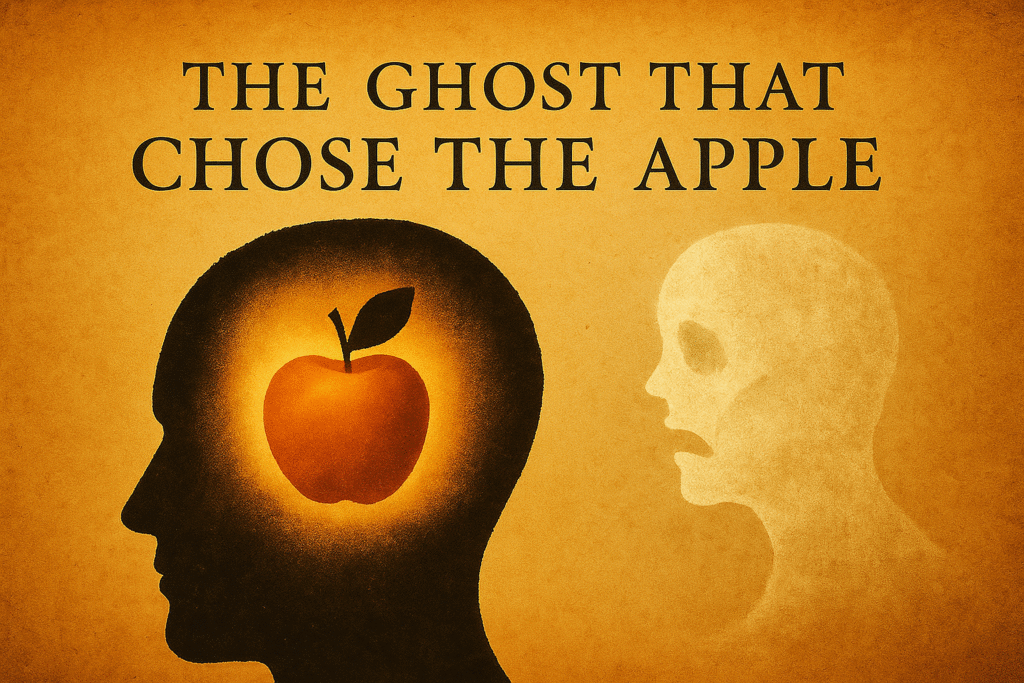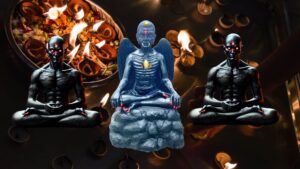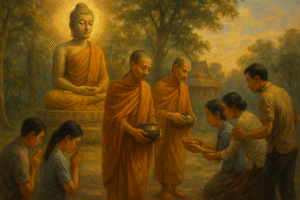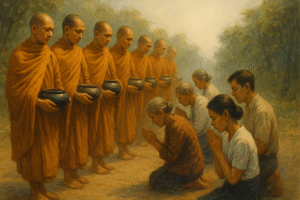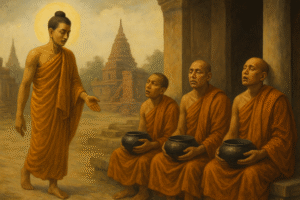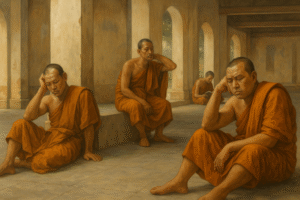The Apple That Chose Itself
What does it mean to choose?
If I ask you to think of a fruit, and the word “apple” arises in your mind—did you truly choose it? Did you scroll through a conscious catalog of fruits, weighing their taste, shape, or cultural symbolism? Or did the apple appear unbidden, like a whisper rising from a place beneath the surface of your awareness?
More importantly, who—what—is it that thinks that thought? Who is the “you” that claims, “I chose the apple”?
This question, so simple on the surface, is the fracture through which the illusion of self begins to crack. We cling to the idea of being the thinker of our thoughts, the decider of our fate. But if we look closely, ruthlessly, we begin to see: the apple chose itself. It rose. It appeared. It thought itself through you.
And the “you” who took credit for the thought? That is the ghost. A phantom voice. A mirror reflecting itself in an endless loop, whispering, I am the one who acts.
But you did not act. You received. The apple came. And you claimed it.
This is not philosophy. This is a direct confrontation with the architecture of consciousness. And it forces us to ask: Is free-will real? Or merely the illusion of authorship within a system we do not control?
Who Is the One Who Chooses?
Let us look deeper.
In the Hindu Vedantic view, what we call “I” is largely made up of Ahamkara—the ego-maker. A construct. A function that organizes thought around a center, even though that center is empty.
In Buddhist analysis, the “self” is broken into five skandhas—form, sensation, perception, mental formations, and consciousness. Each of these aggregates is in flux, without substance, without a sovereign center. They merely arise, interact, pass away.
So then—who chooses? Who thinks? What will is there?
If the thought arises on its own, and the claim of choosing it is also just another thought—then the entire structure collapses. The thinker and the thought are not two. The chooser and the chosen are not separate.
There is only the stream. The flow. And the illusion of the captain riding the waves.
The Two Faces of Will
Still, we must make distinctions. Not all will is the same.
There is egoic will—what the Vedantins call Ahamkara Ichha. This is the will of the conditioned self. The will that wants because it fears. That seeks because it feels lack. This will is not free. It is reactive, bound, shaped by memories, trauma, karma, culture, biology. It operates inside the dream, believing itself awake.
Then there is Primordial Will—Iccha Shakti, in the tantric system. The will that arises not from ego, but from clarity. From the still, ungrasping awareness beyond form. This is not desire masquerading as will. It is not reaction. It is the flame of pure intention arising from a place prior to identity.
The first is compulsive. The second is liberating.
The tragedy is that most people never access the second. Their entire lives are governed by the first.
The Puppet Strings We Call Freedom
We believe we choose. But if we examine the origin of our so-called choices, we find a hall of mirrors.
Your attraction to a certain kind of person—is that free-will? Or the echo of an unmet childhood need?
Your fear of change—is that your decision? Or the imprint of ancestral trauma passed silently through blood?
Your ambition, your laziness, your love of power, your need for approval—are these choices? Or are they the puppeteer’s strings, pulling from behind the curtain?
Let us name these strings:
- Ancestral Commands: The unspoken vows of your bloodline. “We don’t express anger.” “We always sacrifice.” “We don’t rise above the family.” You didn’t create these—but you live them.
- Karmic Imprints: Tendencies formed through past actions—yours, or echoes from other incarnations. These shape your desires, aversions, fears.
- Emotional Reflexes: When fear, shame, lust, or anger take over—what part of you is choosing?
- Cultural Conditioning: The roles, values, and narratives given to you by society. The box you live in, mistaking its walls for your own thoughts.
Is there any act you’ve done that was free of these?
Is there a single decision you’ve made that wasn’t influenced—overtly or covertly—by what came before?
So Where Is the Real Will?
If we are bound by karma, conditioned by ancestors, hijacked by emotion, and shaped by culture—where then is the space for free-will?
The answer is razor-sharp:
True free-will exists only in the rupture.
It exists in that infinitesimal pause between stimulus and response—when you become aware of the script you’re running, and choose not from fear, not from desire, but from clarity.
That is not the freedom to do anything.
That is the freedom to not be pulled by anything.
In that space, the ego does not act.
Awareness acts.
And the action is not chosen—it is revealed.
Free-Will Is a State, Not a Possession
You do not have free-will.
You enter it.
Briefly.
Rarely.
Most of the time, you are a system running on momentum.
But sometimes—when the conditioning is seen clearly, when the emotional wave is held in presence, when karma is felt but not obeyed—a new act is born. One not determined by the past.
This is not the ego choosing.
This is Will arising from the Void.
And that, truly, is freedom.
The Final Question
So now, ask yourself—not as a philosophy, but as a lived interrogation:
Who chose your last desire?
Who decided your current goal?
Who picked the people you are magnetized to?
Who moves your mouth when you speak from anger or love?
Look closely.
If you find a self there, it will vanish under scrutiny.
But if you keep looking—honestly, fiercely—there may come a moment of silence, of emptiness.
In that silence, thought still arises.
But no one takes credit.
No one grasps it.
No one clings.
And that—just maybe—is the beginning of real will.
